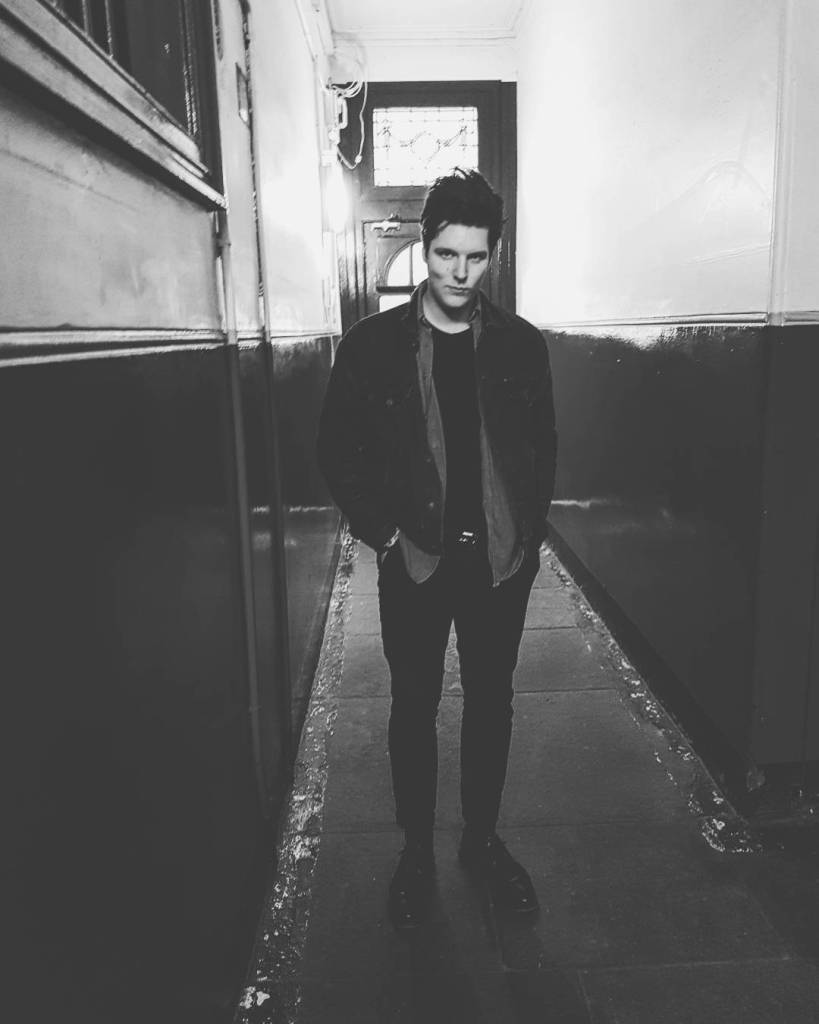Humble and softly-spoken as he sits across from me in a Glasgow café, Timmons has come a long way since that first, chance encounter. “That was quite a bit into what I was doing. I was doing as many gigs as I could and just trying to get my name out there. At King Tut’s, it’s a bit of a ladder, and so you want to get support slots. Of course you want to be supporting people who fit in with what you’re doing so you can capture their fans, but you’ve got to start at the bottom to prove yourself, to prove that you can get people through the door.
“That can be frustrating at times, sometimes it’s just a case of persuading as many of your pals to come and see you for the fiftieth time. Not long after that I felt I’d been doing it for years and had reached a point where it was like I can’t do any more of these.”
 Michael Timmons during one of his performances. Credit: Brendan Waters
Michael Timmons during one of his performances. Credit: Brendan Waters
Now, Timmons is starting to see that hard work pay off, with his single ‘Painting’ released earlier this year and a debut album on the brink of completion. He’s joined me straight from a demoing session. “I’ve been gigging for a year, but also constantly writing. I could probably play a set of entirely new stuff.”
We chat not long before his headline show at Great Western Road’s The Hug and Pint. “It’s a bit of a risk, an experiment, but we’ll see what happens. Hopefully people take a punt on going to see someone they don’t know there.”
In a culture where bands and artists are reliant on so many outside forces helping them on their way to success, it is affirming to see a hard-working, home-grown talent finally start to receive proper recognition.
Before going it alone, Timmons’ early life was steeped in a musical tradition. “Singing has always been a part of my family, as it is in most Scottish families. Family occasions would always have some element of singing songs.
“My dad always sang, and he always wanted to get better at it. He was really into maths, and was studying it, and so traded maths lessons for singing lessons, which I always thought was pretty amazing. He kind of battered his guitar, and shout sang, so I kind of always wanted to try and emulate that.”
Invoking the loneliness and strain that image conjures is integral to Timmons’ appeal. His music, as onstage, puts him and his voice at the centre. It is raw, tortured even; at times uncomfortably close, always intensely personal. The latter, giving something of himself in songs and performances, is extremely important to him and how he views his music. “Before I went solo, I was in a band, playing this big spacey atmospheric music, pretty loud but then quite generic in the sense that there was no personal meaning behind any of the songs. It was all just words that didn’t make any sense.
“That really contributed to and spurred me on to do something more intimate. When you start on your own and you’re putting yourself out there, it’s different. In a band, there are five or six other people taking the hit. It almost didn’t matter as much. But when you’re doing it yourself, people are really listening to what you’re saying.”
Speaking to Timmons properly for the first time in years, I feel like I know almost too much about him while at the same time knowing very little. When his song ‘Painting’ was released, the hustle and bustle of life meant music flew by me without taking it in. When I sat down to listen properly, fully attentive, it was such a rush of emotions – a window into his thought process. Quiet and incredibly spare, it is not a far cry from the pained verses of Elliott Smith, or the shivery, emo-inflected work of Julien Baker.
This soul-bearing, from a young, male Scot, is a stark contrast to some of the macho, male-dominated rock and roll that gets the most exposure in the mainstream. Timmons is aware that the darkness in his music is overpowering. “I always joke that my music is really miserable but looking at it seriously I’d say generally it is quite hopeful.”
Sitting in front of me, Timmons is anything but miserable. “I think I’m quite happy,” he jokes. “Probably a lot of that stuff does come out in my music so I don’t have to waste energy on it in real life. I guess singer songwriters are expected to have that kind of thing in their music. It’s also other people’s stories and things you hear every day, and I reflect on that. I interact with a lot of different people in my job too.”
When Timmons isn’t playing reverb soaked, stripped back sets, or squirreled away making more music, he is an activities and community engagement leader for a local care organisation. He does not shy away from exploring themes and stories from his other career in his music, touching on mental health. “I kind of reflect on a lot of what I see and do on a daily basis.
“Recently, I’ve been writing about family, which isn’t something I’ve done a lot of before. That’s quite nice. And quite different. It almost seems even more personal. Often we dwell on things that are in the past, but eventually you leave it there and move on. Family is always there.”
With a solid grounding to jump off from, Timmons is looking to the future, with a full tour and a record release in his sights (“I’ve not got grand plans, just reasonably achievable goals”).
Timmons is a young artist who is not indicative of the scene he is in, and yet hyper aware of what’s going on within it. He praises the Scottish music landscape for accepting him and his style, but is clued up on how it can, at the same time, be stifling and choke up the number of chances available for young artists to break through. “I think the Scottish music scene is in a good place. There’s a ludicrous amount of bands out there, and there’s so much good music. I maybe wasn’t as entrenched in it until the last year or so, and I feel as if I’ve really got to know people and hopefully established myself in it. I don’t know if it’s just because I’ve released something, I feel more official now.
“In terms of opportunities, it can still be a struggle. Getting slots at festivals and stuff – I’d like to be more involved in some of that kind of thing.”

Fortunately, in between gluing CD cases, sending out his music to publications and radio shows across Scotland and putting as much of his own time, effort and money into promoting his music when possible, Timmons has supporters in places that matter.
Gargleblast studios in Hamilton – perhaps most famous within the independent music scene for its involvement with cult Scottish band Life Without Buildings – and one of its producers, Andy Miller – who worked on that band’s album Any Other City, as well as records by Mogwai and Songs: Ohia – have taken Timmons in and helped him to hone his sound while recording his upcoming full length.
“Andy is a really amazing producer, and he’s worked with so many talented people. He’s been helping me focus on what I’m doing,” he tells me. “The songs have become even more stripped back as we set up and recorded live, trying to capture the atmosphere and feeling of the gigs.
“We recorded every song in just a few takes – a far cry from being in a band, doing your riff 50 times and polishing every detail. This way I heard every imperfection. At first, I found that difficult, but Andy encouraged me to let go. Hearing the slips and mistakes, the emotion, was what made it interesting.”
What has resulted is not a crystalline portrayal of Timmons as an artist and person but, much like the cover of his single, an abstract painting, hued in many shades, presented for our own interpretation. Timmons is hopeful that the honesty of his music will continue to win over fans. “I think generally people like that aspect of my songs! I think that, even though the music and lyrics are deeply personal to me, people are able to relate to some of the stories or the words in a universal way. It’s a nice feeling.”
Stream Michael Timmons’ music on Soundcloud and YouTube, and follow him on Facebook and Twitter.
Featured photo by Brendan Waters
Below check out our video report of Michael Timmons’ headline show at The Hug and Pint on 19 August
Share this:




